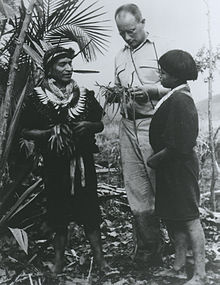
Ethnobotany is an interdisciplinary field at the interface of natural and social sciences that studies the relationships between humans and plants.[1][2] It focuses on traditional knowledge of how plants are used, managed, and perceived in human societies.[3][4]Ethnobotany integrates knowledge from botany, anthropology, ecology, and chemistry to study plant-related customs across cultures. Researchers in this field document and analyze how different societies use local flora for various purposes, including medicine, food, religious use, intoxicants, building materials, fuels and clothing.[5] Richard Evans Schultes, often referred to as the "father of ethnobotany",[6] provided an early definition of the discipline:
Ethnobotany simply means investigating plants used by primitive societies in various parts of the world.[7]
Since Schultes' time, ethnobotany has evolved from primarily documenting traditional plant knowledge to applying this information in modern contexts, particularly in pharmaceutical development.[8] The field now addresses complex issues such as intellectual property rights and equitable benefit-sharing arrangements arising from the use of traditional knowledge.[8]
- ^ Garnatje, Teresa; Peñuelas, Josep; Vallès, Joan (March 2017). "Ethnobotany, Phylogeny, and 'Omics' for Human Health and Food Security". Trends in Plant Science. 22 (3): 187–191. doi:10.1016/j.tplants.2017.01.001. hdl:10261/146234.
- ^ Zimdahl, Robert L.; Basinger, Nicholas T. (2024). "Uses of Weeds—Ethnobotany". Fundamentals of Weed Science. pp. 49–65. doi:10.1016/b978-0-443-15723-3.00013-2. ISBN 978-0-443-15723-3.
- ^ Iwu, Maurice M. (2002). "Ethnobotanical approach to pharmaceutical drug discovery: Strengths and limitations". Ethnomedicine and Drug Discovery. Advances in Phytomedicine. Vol. 1. pp. 309–320. doi:10.1016/S1572-557X(02)80034-4. ISBN 978-0-444-50852-2.
- ^ "Ethnobotany". www.fs.fed.us. Retrieved 2 May 2018.
- ^ "Ethnobotany". www.eplantscience.com. Archived from the original on 14 April 2018. Retrieved 2 May 2018.
- ^ Kandell, Jonathan (13 April 2001). "Richard E. Schultes, 86, Dies; Trailblazing Authority on Hallucinogenic Plants". The New York Times. Retrieved 2 May 2018.
- ^ Kochhar, S. L. (2016). Economic Botany: A Comprehensive Study (5 ed.). Cambridge University. p. 644. ISBN 9781316675397.
- ^ a b Soejarto, D.D.; Fong, H.H.S.; Tan, G.T.; Zhang, H.J.; Ma, C.Y.; Franzblau, S.G.; Gyllenhaal, C.; Riley, M.C.; Kadushin, M.R.; Pezzuto, J.M.; Xuan, L.T.; Hiep, N.T.; Hung, N.V.; Vu, B.M.; Loc, P.K.; Dac, L.X.; Binh, L.T.; Chien, N.Q.; Hai, N.V.; Bich, T.Q.; Cuong, N.M.; Southavong, B.; Sydara, K.; Bouamanivong, S.; Ly, H.M.; Thuy, Tran Van; Rose, W.C.; Dietzman, G.R. (August 2005). "Ethnobotany/ethnopharmacology and mass bioprospecting: Issues on intellectual property and benefit-sharing". Journal of Ethnopharmacology. 100 (1–2): 15–22. doi:10.1016/j.jep.2005.05.031. PMID 15993554.